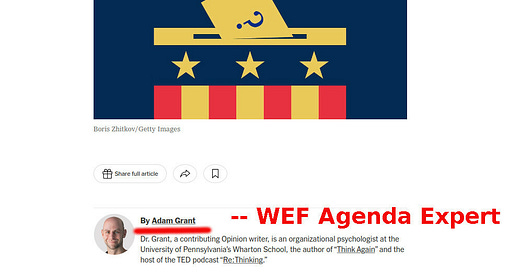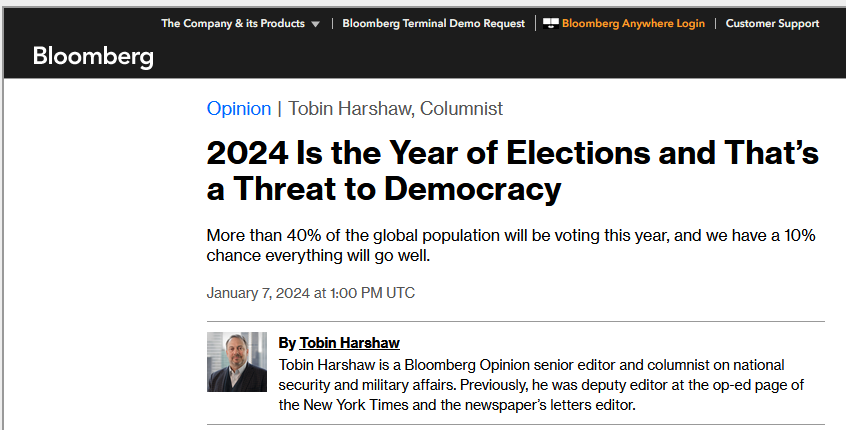I’m indebted to Igor Chudov for inspiring this post
I am half(? some? part?) way through writing a post about who should vote and how they should get their representatives which I’ll link to when I finish it, however in the meantime I’ve spotted a number of recent articles where the “right sort” of people are very very concerned that the “wrong sort of person” i.e. orange might be re-elected president of the US. They are also concerned, as in the post (archive) I screenshot as a title to this, about the British voting for the wrong people, the Taiwanese voting for the wrong people and so on. The British of course were a major part of the problem eight years ago, though they did (fortunately) not elect Corbyn as PM:
“Bookmakers were offering punters a 1-in-5 chance of Donald Trump winning the US presidency that November. There were similar odds on three other ‘unthinkables’: Britain voting to leave the European Union; the extreme left-winger Jeremy Corbyn being elected Britain’s prime minister; and Marine Le Pen ascending to the French presidency.” Unfortunately, John beat the spread: Two of the unthinkables became more than thinkable — and don’t count Le Pen out quite yet.
In fact, as far as that article’s author is concerned I believe the Taiwanese may be considered to have already voted for the wrong man because the bloke they chose was the one least liked by Winnie the Flu
While not explcitly mentioned I’m sure the author is equally upset that the Germans may vote in large numbers for the AdF because they have some weird idea that Germany should be a nation populated mostly by, err, Germans
As Igor highlighted in an earlier post, the NY Times invited a nice gentleman from the Davoisie leadership group (the WEF) to explain that Elections are Bad for Democracy!!!111!!!!@#!!!!
I mean there used to be a quip once upon a time that “If voting made a difference, they wouldn't let us do it.” (which probably wasn’t originated by Mark Twain though much of the internet thinks it was), but as far as our glorious leaders are concerned it seems to have been updated in the last eight years to “err, actually voting does make a difference and we need to stop that”. In the last year they’ve gone from whispering it to shouting it, which means that we can be pretty certain that the US elections in November will be fortified good and proper.
This substack notes the steps already being taken and how they are not, so far at least, working
It is worth noting that the general argument of “we have to protect democracy by undemocratic methods” is rather similar to the Popper’s “Paradox of Tolerance” meme which Holly MathNerd expertly demolished just before Christmas
It turns out it’s not just Bloomberg and the NY Slimes. The Pinko Times is also getting in on the act:
To millions of Americans, one of the top contenders for November’s presidential elections, Donald Trump, was not joking when he said that he wanted to be a dictator on day one if re-elected. After all, he had tried to overturn the 2020 election and his supporters stormed the Capitol to stop the winner from taking power. Trump’s opponents, therefore, applauded a decision by the Colorado Supreme Court to remove him from the state’s 2024 ballot because of his alleged role in the Capitol attack.
In February, the US Supreme Court will hear the case and might bar Trump from the ballot. Many think that it should. But while legitimate fears abound that a second Trump presidency could irreparably destroy American democracy, an unlikely case — that of Turkey under President Recep Tayyip Erdoğan — offers a cautionary tale as to how far one should go to stop a wannabe autocrat.
That article mentions President Recep Tayyip Erdoğan’s remark that “Democracy is like a tram. You ride it until you arrive at your destination, then you step off.”
What it doesn’t quite get is that the people who seem to want to get off the Democracy tram now are not the populists as the current set of elected leaders and the masses of bureaucrats, journalists and academics that support them.
PS I fear sure that the recent “Substack are hosting Nazis” made up scandal and the ongoing criticims of Elon Musk’s X are a part of the battlefield preparation for a post-November world where the orange man is somehow prevented from taking office and they want to deny that anything of the sort happened. So be prepared for the only use of gas that these people approve of:












The problem with assigning the need for “justice” to every human endeavor is the concept is indelibly tied to the prejudices of the observer. Ten people observing a binary outcome might well have 10 very different views about how “just” the result is, completely independent of the actual result.
Ambiguous platitudes like “fairness” is fine to aspire. It’s good when things are considered fair. Life often isn’t, and the concept doesn’t apply well to real-world events. It can be fair when a poor athlete succeeds over a more privileged athlete. It’s also fair when a faster runner defeats a slower runner. What about when a faster privileged athlete defeats a slower, poorer athlete? Or a poorer, faster athlete loses out to a more privileged but slower athlete? Fair is a good thing, but it can’t be defined clearly enough to make an operating principle beyond simply ensuring an open competition.
Likewise justice outside a formal legal setting has no definable boundaries. Each observer colors the outcome according to their observation. Activist groups aggressively apply the term to their own interests, most commonly to deny justice (dare I say “fairness”) to their perceived opposition.
Much like watery tarts lying in ponds distributing swords, any form of focused justice (social justice, reproductive justice, etc.) is no basis for a system of government.